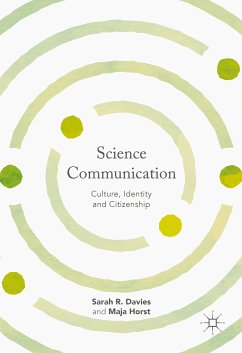This book describes current practices in science communication, from citizen science to Twitter storms, and celebrates this diversity through case studies and examples. However, the authors also reflect on how scholars and practitioners can gain better insight into science communication through new analytical methods and perspectives. From science PR to the role of embodiment and materiality, some aspects of science communication have been under-studied. How can we better notice these?
Science Communication provides a new synthesis for Science Communication Studies. It uses the historical literature of the field, new empirical data, and interdisciplinary thought to argue that the frames which are typically used to think about science communication often omit important features of how it is imagined and practised. It is essential reading for students, scholars, and practitioners of science education, science and technology studies, museum studies, and media and communication studies.
Dieser Download kann aus rechtlichen Gründen nur mit Rechnungsadresse in A, B, BG, CY, CZ, D, DK, EW, E, FIN, F, GR, HR, H, IRL, I, LT, L, LR, M, NL, PL, P, R, S, SLO, SK ausgeliefert werden.
"It explores the role of capitalism in this context, the relevance of ecology, and more. It reminds readers that scientists publicize their research to persuade funding agencies rather than for the intrinsic worth of the science. ... This is a relevant, readable, informative book ... . Summing Up: Highly recommended. Upper-division undergraduates through faculty." (V. V. Raman, Choice, Vol. 54 (10), June, 2017)
Es gelten unsere Allgemeinen Geschäftsbedingungen: www.buecher.de/agb
Impressum
www.buecher.de ist ein Internetauftritt der buecher.de internetstores GmbH
Geschäftsführung: Monica Sawhney | Roland Kölbl | Günter Hilger
Sitz der Gesellschaft: Batheyer Straße 115 - 117, 58099 Hagen
Postanschrift: Bürgermeister-Wegele-Str. 12, 86167 Augsburg
Amtsgericht Hagen HRB 13257
Steuernummer: 321/5800/1497
USt-IdNr: DE450055826
Bitte wählen Sie Ihr Anliegen aus.
Rechnungen
Retourenschein anfordern
Bestellstatus
Storno









